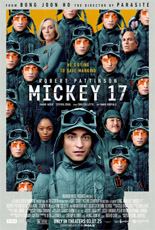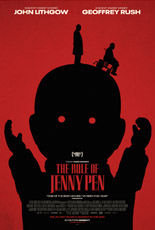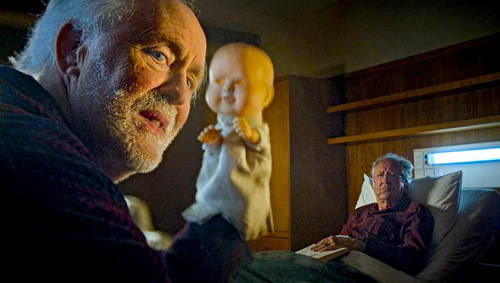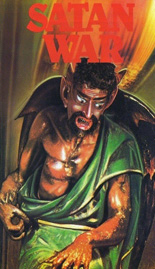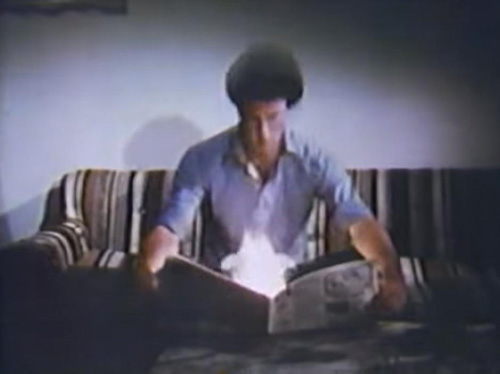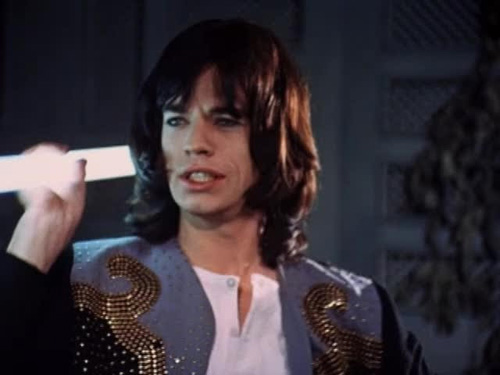
Let’s get the biggest letdown out of the way: Unfortunately, Bong Joon Ho’s Mickey 17 doesn’t feature the 1981 pop hit “Mickey” by Toni Basil. The flick does, however, have Toni Collette (Hereditary) obsessing over various sauces. I guess that’s a decent enough consolation.
Beyond the sauce, Mickey 17 is a compelling, yet quite a bit weaker satire from South Korea’s best-known director. While it certainly won’t receive the same critical celebration as 2018’s Parasite, it still holds a comfortable place among a stellar filmography. That said, if you’d sooner watch Mother or Memories of Murder over Okja or Snowpiercer, this one might not be the Joon Ho joint you’d hope for.
Mickey 17 is a fairly close adaptation of Edward Ashton’s 2022 novel, Mickey7 (minus the 10 extra Mickeys, of course). On the run from a powerful mobster with a chainsaw fetish, Mickey (Robert Pattinson, The Batman) and his “friend” Timo (Steven Yeun, Nope) get jobs with a commercial space cruiser bound to colonize a mysterious ice planet. While Timo negotiates for a position as a pilot, Mickey becomes the ship’s only “expendable.” Possibly the worst gig imaginable, Mickey is employed to die and get reprinted so he can effectively gauge the dangers of space travel and colonization.
More so than Joon Ho’s other sci-fi satires, Mickey 17 excels in its casting. Pattinson channels his inner John C. Reilly to deliver a hilarious and endearing performance. His attention to physical comedy also excels, appropriately matching the energy of his character’s existential (and interplanetary) nightmare. Plus, Mark Ruffalo (Poor Things) and Collette carry the antagonism as the colony ship’s insufferable, corporate power couple.
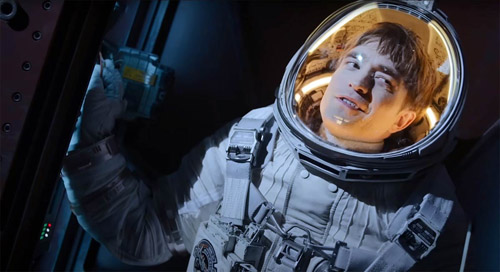
That said, the film’s attempt at satire also works against it. Kenneth Marshall (Ruffalo) obviously pulls from Donald Trump and Elon Musk, but unfortunately, Joon Ho doesn’t say anything interesting about that. Sure, Marshall is a bumbling idiot who has more power than he should have ever been granted, but the film fails to actualize the consequences of that in a meaningful way. As entertainment, the character operates fine. As something genuinely interesting and resonating, on the other hand, he fails miserably.
While that miss eclipses most of Mickey 17’s commentary that lands, it doesn’t completely ruin it. The film’s critique on automating and replicating human capability to extinction works. And though the monstrous centipede-buffalo stand-in for Indigenous societies feels a bit gross, at least where the film’s heart lands doesn’t. In other words, it flounders as a modern, pointed satire, but saves itself as a dystopian black comedy.
Certain sequences thankfully save the film when awkward flashbacks and hallucinations cause it to stumble. It isn’t that those achronological scenes should’ve been removed outright. Rather, their presentation makes the film noticeably stumble toward its crescendo. Which feels bizarre, given the montages and dialogue push the movie forward so well.
To be clear, Mickey 17 is an entertaining, worthwhile ride. It just winds up among Joon Ho’s weaker works, fighting for a knife in the slush with Snowpiercer. Ultimately, that’s still pretty high praise. —Daniel Bokemper

